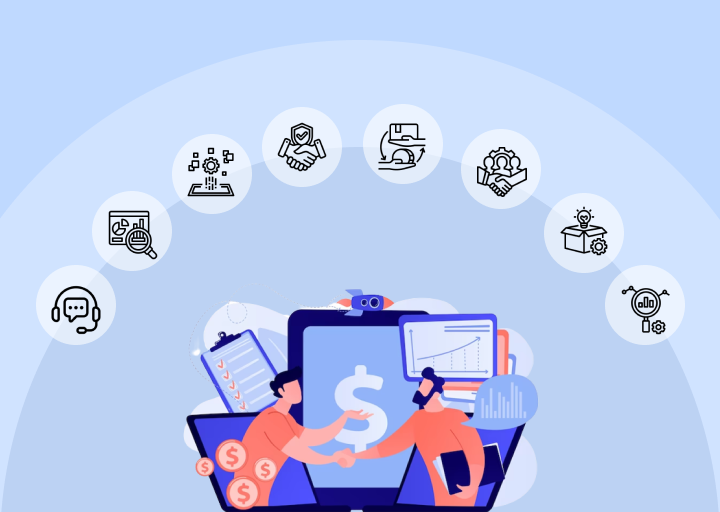In the contemporary era of digitalization, establishing a B2B marketplace has the potential to revolutionize businesses seeking to connect and collaborate with other enterprises. A B2B marketplace offers a sophisticated platform for vendors and purchasers to engage, engage in the trade of products or services, and cultivate mutually advantageous relationships. Nevertheless, crafting a prosperous B2B marketplace necessitates meticulous planning, strategic implementation, and an in-depth comprehension of the target audience. Within this article, we will delve into the fundamental steps required to construct a flourishing B2B marketplace and achieve triumph in the digital world.

1- Conduct Market Research and Identify a Niche
Before diving into the development process, it’s essential to conduct thorough market research and identify a profitable niche for your B2B marketplace. Examine the prevailing market panorama, assess rival propositions, and uncover voids or unexplored prospects. By concentrating on a particular industry or niche, you can customize your platform’s characteristics, offerings, and promotional endeavors to address the distinctive requirements of your target demographic.
2. Define Your Value Proposition
To distinguish yourself in a crowded market, you require a captivating value proposition that distinguishes you from your competitors. Precisely articulate what renders your B2B market distinctive and convey this worth to your target audience. Whether it involves presenting a seamless user experience, granting access to exclusive suppliers, or delivering exceptional customer support, your value proposition should address the challenges faced by your customers and offer a clear motivation for them to opt for your platform.
3- Choose the Right Technology Platform
Selecting the right technology platform is crucial for the success of your B2B marketplace. Consider factors such as scalability, security, customization options, and integration capabilities when choosing a platform or developing a custom solution. Leverage robust e-commerce platforms or explore specialized online marketplace software that caters specifically to your industry requirements. A reliable and feature-rich technology platform will ensure smooth operations and a seamless user experience for your marketplace participants.
4- Build Trust and Ensure Safety
Trust and safety are paramount in B2B transactions. Establish a robust verification and authentication process for both sellers and buyers on your platform. Implement secure payment gateways and encrypted communication channels to protect sensitive information. Additionally, consider implementing a rating and review system to build trust among marketplace participants. Building a reputation for reliability and security will attract more users to your B2B marketplace and foster long-term relationships.
5- Curate High-Quality Suppliers and Buyers
The success of a B2B marketplace hinges on the quality of suppliers and buyers within the ecosystem. Implement a rigorous onboarding process to curate reliable suppliers and ensure they meet your marketplace’s standards. Similarly, vet potential buyers to maintain a high level of trust and integrity within your platform. By curating high-quality participants, you create an environment where businesses can confidently engage in transactions, leading to repeat business and positive word-of-mouth referrals.
6- Foster Collaboration and Engagement
Encourage collaboration and engagement among marketplace participants to create a vibrant and active community. Enhance communication and knowledge exchange by incorporating elements like interactive forums, messaging platforms, and networking gatherings. By cultivating a sense of inclusivity and providing avenues for cooperation, you establish an ambiance conducive to the growth of enterprises, the formation of alliances, and the pursuit of novel prospects.
7- Implement Data Analytics and Insights
Harness the potential of data analytics to acquire invaluable discernments into user conduct, market inclinations, and performance metrics. Deploy resilient analytics instruments to monitor pivotal performance benchmarks (KPIs), oversee user interaction, and recognize avenues for enhancement. Through meticulous analysis of data, you can make decisions based on data, refine user experiences, and consistently augment your B2B marketplace to align with the ever-evolving demands of the market.
8- Develop a Comprehensive Marketing Strategy
A precisely defined marketing strategy is crucial in attracting users and fostering the adoption of your B2B marketplace. Identify your target audience and formulate tailored marketing campaigns to effectively engage with them. Employ search engine optimization (SEO) techniques to enhance your platform’s visibility in search engine results. Harness the power of content marketing, social media advertising, and targeted email campaigns to cultivate awareness, generate leads, and transform them into active participants on your B2B marketplace.
9- Provide Exceptional Customer Support
Superior customer support is a key differentiator in the B2B marketplace landscape. Establish a dedicated support team that promptly addresses user queries, resolves issues, and ensures a positive user experience. Present a variety of support channels, including live chat, email, and phone, to accommodate diverse user preferences. Through the provision of exceptional customer assistance, you cultivate trust, nurture loyalty, and stimulate enduring engagement on your B2B marketplace.
Conclusion
To establish a prosperous B2B marketplace, one must adopt a strategic approach, pay meticulous attention to intricate details, and possess a profound comprehension of the target audience. By conducting comprehensive market research, delineating a captivating value proposition, harnessing the appropriate technological platform, curating participants of exemplary quality, and implementing robust marketing and support strategies, it becomes possible to develop a B2B marketplace that unlocks novel prospects for businesses in this digital era. Embrace the immense potential of digital connectivity and embark on your journey to construct an extraordinary B2B marketplace today!